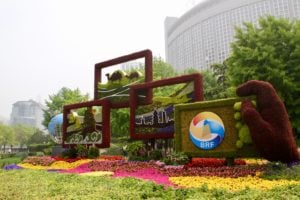In August 2018, El Salvador followed the Dominican Republic and Panama in switching diplomatic allegiance from Taiwan to China. But in March 2019, Nayib Bukele, then president-elect, cast doubt over whether his government would maintain that status.
“China does not play by the rules; they do not respect the rules,” he said.
The Chinese embassy in El Salvador responded with a statement affirming that economic cooperation between China and El Salvador would not be a “debt trap” but instead “a sweet deal for both nations.”
Since then, commercial relations, which centre heavily on El Salvador’s export of sugar, have evolved rapidly. After taking office in June, Bukele admitted he had to “recognise China’s status in the world” and cement ties. El Salvador sent US$83.2 million of products to China last year, up 82% on the previous year, making it the sixth biggest destination for El Salvadorian exports.
95%
sugar's share of El Salvador's total exports to China
Sugar makes up 94.6% of exports to China, according to the Central Reserve Bank (BCR). While this is cause for optimism in some quarters, small farmers and other observers are conscious of the consequences of expanding agribusiness in the second most deforested country in Latin America.
Sugar union
The Sugar Association (AAES), the union in charge of production in El Salvador, expressed concerns about cancelling a free trade agreement with Taiwan, which was set to take place in March 15 of this year. In February, it sued the ministry of foreign affairs.
“As the productive sector we feel highly affected by this because we will suffer substantial economic losses,” said Mario Salaverría, the union’s president. “We were not consulted in this process at all and neither was Taiwan.” The AAES had already signed deals to export 80,000 tonnes of sugar.
The union is also concerned about the high tariffs China has imposed on sugar. The country imports 1.94 million tonnes a year, making it one of the largest global buyers.
Since there is no regulation around agribusiness, companies can abuse resources here
But in 2016, drought hit the domestic sugar crop and small farmers (mainly from Yunnan province) suffered. In an effort to support them, last year China began restricting imports by placing high tariffs on its main suppliers, mainly Brazil and Thailand.
Resenting the impact on their economy, Brazil complained to the World Trade Organisation.
Looking to placate El Salvadoran producers, China then made a goodwill statement in March this year: “Chinese businesses are motivated to buy sugar and other products from El Salvador … the tariffs will be paid by the sugar importers rather than exporters. The producers from El Salvador can feel at ease with this aspect,” the Chinese Embassy in San Salvador tweeted.
“China has talked about wanting to buy our sugar, but for us the free trade agreement with Taiwan is non-negotiable,” argued Salaverría. “Sure, we have already been selling to China, but at what we call ‘world market rates’, with tariffs of 85%. With Taiwan we paid zero tariffs,” he said.
Salaverría explained that the AAES’ mission is not to break relations with China but rather, to maintain a commercial relationship with Taiwan and a diplomatic one with China.
He said the union had already met with government officials who privately agreed to maintain the FTA with Taiwan. The Salvadoran High Court halted the cancellation of the FTA, but there hasn’t been an official statement on its continuation.
The environmental cost of sugar production
High-demand and economic need in El Salvador have led to the expansion of industrial agriculture, mostly sugar and coffee, fuelling soil degradation and deforestation. Sugar cane fields use a lot of pesticides, which harm soil and water sources.
Whoever has the technology to exploit water does it without any consequence in El Salvador
“Environmental problems aren’t commonly talked about in El Salvador,” Gabriel Labrador, a researcher from investigative news platform El Faro explained. “Since there is no regulation around agribusiness, companies can abuse resources here.”
El Salvador has the second largest surface area of cane sugar plantations in Central America and only to Haiti has lost a larger share of its forested land area. More than half the land is unsuitable for cultivation and erosion is rampant.
These problems combine to make people vulnerable to natural disasters and drought. Water sources are also highly contaminated.
“Whoever has the technology to exploit water does it without any consequence in El Salvador,” Labrador added. “Cane sugar is the industry that consumes the most water. There is a serious environmental impact due to the amount of water used and there is no state policy.”
In 2016, over 250,000 gallons of molasses from a sugar cane factory spilt into the Magdalena river, affecting 400 families and killing thousands of fish, crustaceans, molluscs and amphibians.
Labrador said: “Since there is no policy and real enforcement in the sector, controlling the environmental impact depends on the goodwill of the companies – and as demand grows that is a dangerous thing.”









